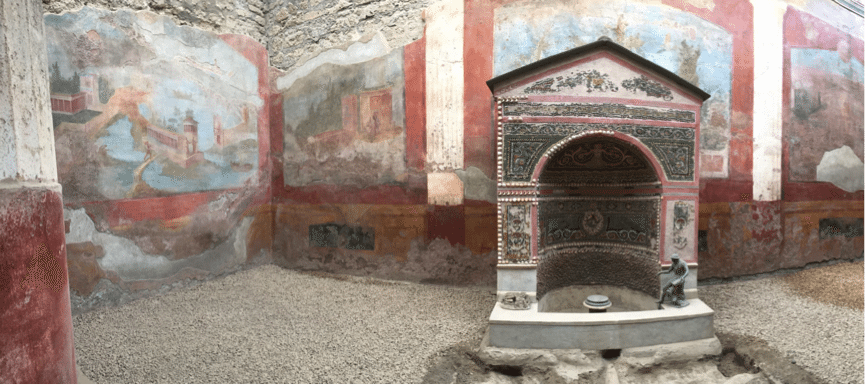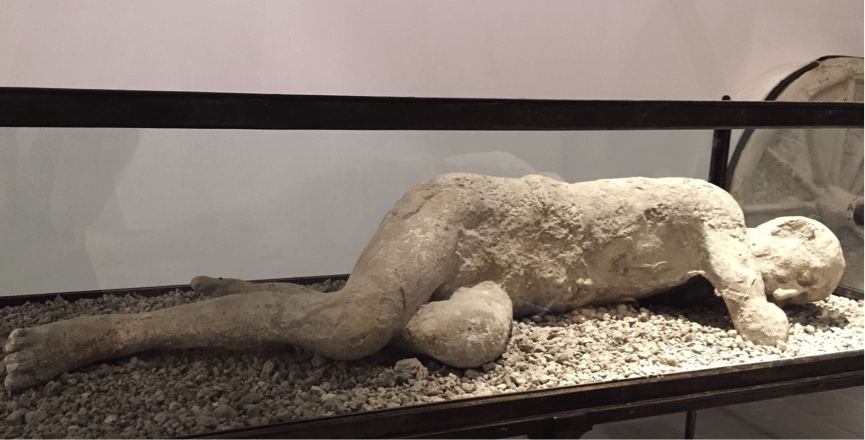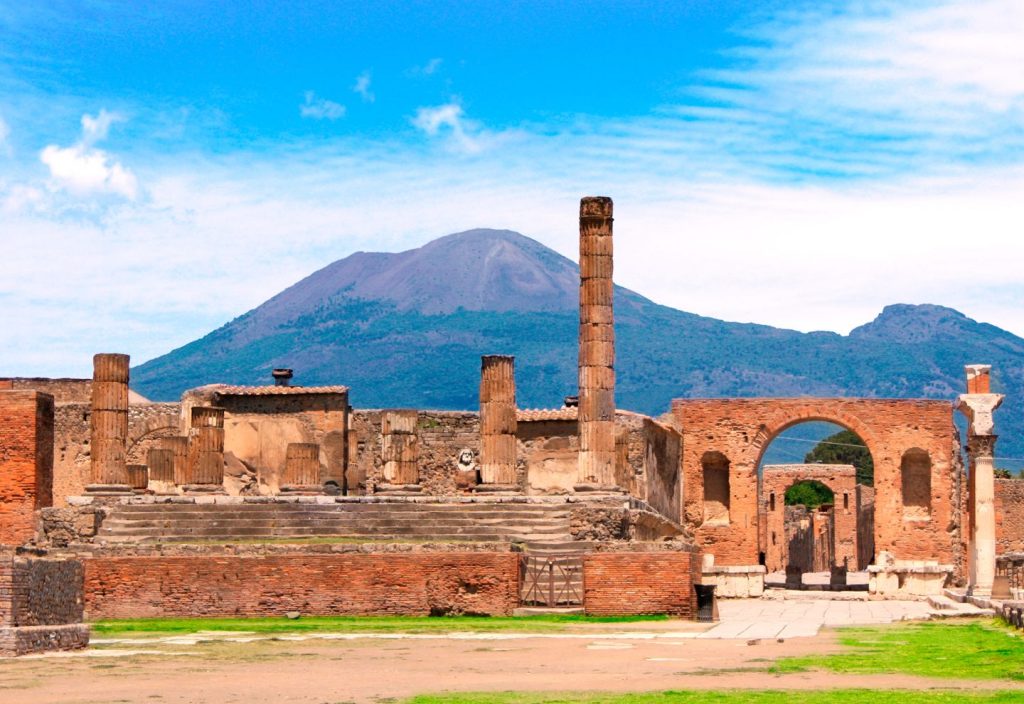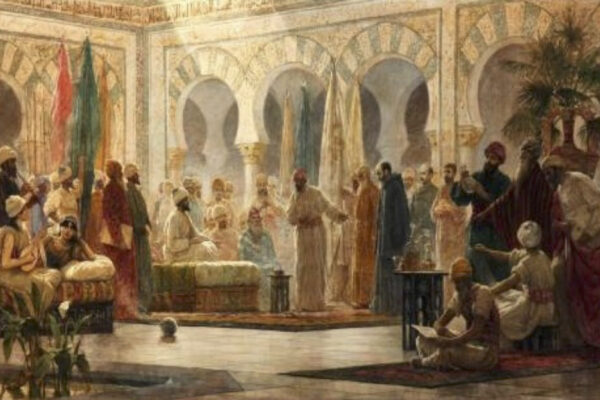Pompeii is one of those places that feels too surreal to actually be real. Rather than an ancient town, it feels like wandering on a movie set or part of a vivid, but fanciful dream.
For those who are only vaguely familiar with the story, Pompeii is a town in central Italy, approximately an hour from Naples and three from Rome, which sits at the base of Mount Vesuvius. Mt Vesuvius is a massive volcano and is still active, but thankfully it hasn’t erupted since World War II.
In 79 AD, almost 2000 years ago, there was a massive eruption, which buried the entire town, and several surrounding villages, burying the buildings and people alike, and preserving them perfectly in the ash that spilled out.
Over time, the ash solidified, and the entire town was frozen in a time warp until excavation began in the last couple of centuries.

What this means, essentially, is that Pompeii is the best-preserved architectural site in the world. Walking through the cobbled streets, you can see beautiful and only slightly faded paintings adorning people’s homes, graffiti, political slogans painted on the walls, and the almost-intact remains of people’s homes, shops and places of worship. It feels like a town abandoned twenty years ago rather than 2000.
By far the most striking thing about Pompeii though is the plaster casts. Essentially, the townspeople who remained when the volcano erupted (approximately 3000 out of a total population of 15,000) were killed almost instantly by the poisonous fumes emitted. Shortly afterward, the ash encased them in the same position that they were in immediately prior to their death. Over time, their bodies decayed but the shapes they left in the now-solidified ash remained. The first archaeologists to discover the site poured plaster into these shapes and then dug gently around them, basically creating exact replica casts. Today, about 100 of these casts are on display in Pompeii, and around the world. You can see pregnant women protecting their stomachs, children crawling, and people in various stages of undress and even a dog trying to escape.
Visiting Pompeii is somewhat overwhelming. You cannot help but wonder about the lives of those who lived here. From an Islamic perspective, there’s so much to ponder on. The people who died here were generally prosperous and lived comfortable lives by the sea. In those days, the town would have been less than a day’s travel from Rome, the centre of the Roman Empire, one of the greatest civilisations of all time. Close enough to be relevant, but far away enough not to get too tangled in the political upheavals of the era. They were intelligent people, with well laid out roads, drains, gardens and public spaces. Put simply, they must’ve thought they had everything sorted. And then, overnight, they were gone.

It really made me think about our lives.
No matter how secure our lifestyles seem, they too are fragile, held by a thread. All of our best-laid plans are subject to circumstances beyond our control, and this has been proven to us time and time again. There really is no guarantee that any of us will be here tomorrow, and walking through the dusty streets of this ghost town really brings that home.
Similarly, all that we treasure in this world is inherently transient. The inhabitants of Pompeii were people of luxury and pleasure. There are many restaurants, bathhouses and even brothels still standing. They had beautiful houses and gardens, and large amphitheatres for concerts and watching gladiatorial performances. Yet when they died, all that which seemed so important whilst they were alive became instantly worthless to them. Ali ibn Abu Talib (as) once visited a graveyard and addressed the graves, saying:
“…As for the houses (you left behind), they have been inhabited by others; the wives (you left) have been married by others, the properties have been distributed (amongst heirs). That is our news, what is your news?”
He turned towards his companions, and said,
“If they were able to speak then they would answer: ‘Verily the best provision is God-wariness (Taqwa).'” – Nahjul Balagha: Saying 130.
In their short imagined reply, you can almost hear the bitter regret, at the time wasted and energy expended down the wrong avenues, when the truth is now so obvious to them. All effort spent other than in the service of God was no ‘provision’ for them at all now.
On a similar note, in Sura Jumah (62:8), Allah addresses the disbelievers:
“…The death from which you flee, indeed, it will meet you. Then you will be returned to the Knower of the unseen and the witnessed, and He will inform you about what you used to do.”
 Subliminally, I think we’re all ‘fleeing’ from death, by pretending it’s not ever approaching, and by immersing ourselves so fully in our day-to-day lives. It’s easy to condemn people of times gone by for their lack of foresight, but when we get caught up in our daily routines of work, family and leisure, do we not lose sight of our ultimate goals and aims too?
Subliminally, I think we’re all ‘fleeing’ from death, by pretending it’s not ever approaching, and by immersing ourselves so fully in our day-to-day lives. It’s easy to condemn people of times gone by for their lack of foresight, but when we get caught up in our daily routines of work, family and leisure, do we not lose sight of our ultimate goals and aims too?
When we are isolated from the distractions of this world by times like the months of Muharram and Ramadan, or by going to Umrah or Hajj, then we become more focused on how to prepare for our next lives, but when we are transplanted back into our routines, then we quickly forget. It may sound odd, but for me, personally, Pompeii was as important a trip as any to a holy city or shrine, and one I would highly recommend to anyone.
by Shaahid Hassan





